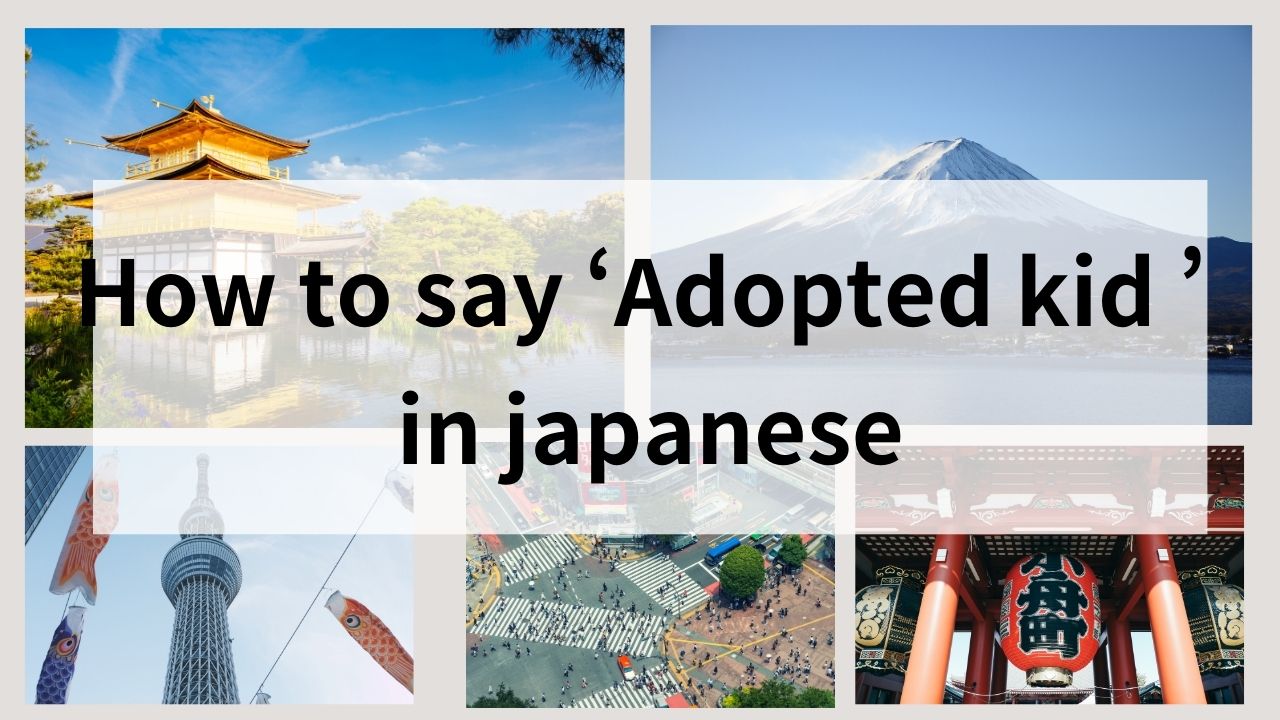Are you curious about how to refer to an “adopted kid” in Japanese? The concept of adoption and the terminology surrounding it in Japan can vary significantly from Western cultures. This guide will explore the Japanese expressions related to “adopted kid,” their cultural significance, and practical applications.
How Do You Say “Adopted Kid” in Japanese?
The most common term for “adopted child” in Japanese is 養子 (ようし, yōshi). This term is used to describe a child who has been legally adopted, and it applies in both formal and informal contexts.
The Japanese Word for Adopted Child: Yōshi (養子)
“Yōshi” is typically used in discussions about adoption, family structures, and legal matters. For example:
- 養子縁組 (ようしえんぐみ, yōshi engumi): “Adoption process.”
- 養子にする (ようしにする, yōshi ni suru): “To adopt (a child).”
- 養子を迎える (ようしをむかえる, yōshi o mukaeru): “To welcome an adopted child.”
Kanji for Adopted Child: 養子
The kanji for “adopted child,” 養子, combines two characters: 養 (yō) meaning “to nurture” or “to rear,” and 子 (shi) meaning “child.” This reflects the idea of nurturing a child who is not biologically one’s own. The term is used in various contexts related to family and adoption.
Cultural Significance of Adoption in Japan
Adoption in Japan has a unique cultural context. Traditional views on family and lineage have influenced the adoption process, often focusing on preserving family names, especially among males. Adoption is not only seen as a means to provide a child with a family but also as a way to ensure the continuation of family lineage.
Adoption as a Family Tradition
In Japan, adoption has historically been more common among families that do not have biological male heirs. This practice is known as 家制度 (かせいど, kaseido), which emphasizes the importance of family lineage. An adopted son might take on the family name and inherit the family estate, reflecting the traditional values associated with continuity and legacy.
Modern Perspectives on Adoption
In contemporary Japan, adoption is becoming more recognized as a means to provide homes for children who need them, including those from foster care. However, societal stigma can still exist, particularly regarding the perception of adopted children and their place within the family unit. Discussions surrounding adoption are evolving, and the language around it is also changing to reflect these new perspectives.
Practical Applications of “Adopted Kid” in Japanese
Understanding how to use the term “yōshi” in conversation can help facilitate discussions about adoption and family dynamics in Japan.
Talking About Adoption in Daily Conversation
Here are some examples of how “yōshi” is used in everyday conversation:
- 彼は養子です (かれはようしです, Kare wa yōshi desu): “He is an adopted child.”
- 養子を迎えました (ようしをむかえました, Yōshi o mukaemashita): “We welcomed an adopted child.”
Cultural References to Adoption
Adoption is also depicted in various forms of Japanese media, including literature, television, and film. These portrayals can help shape public perceptions and attitudes toward adopted children and their families.
FAQs
Here are some frequently asked questions about adoption in Japan.
Is Adoption Common in Japan?
While adoption is less common in Japan compared to Western countries, it is gaining recognition as a viable option for children in need of families, especially in the context of foster care.
How Do You Say “To Adopt” in Japanese?
The phrase “to adopt” in Japanese can be expressed as 養子にする (ようしにする, yōshi ni suru). This phrase directly translates to “to make (someone) an adopted child.”
Conclusion
Understanding the term “養子 (yōshi)” and its cultural significance provides valuable insights into the Japanese views on adoption and family. By learning about these concepts, you can appreciate the complexities of family structures in Japan and engage in meaningful conversations about adoption.








